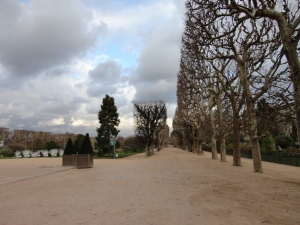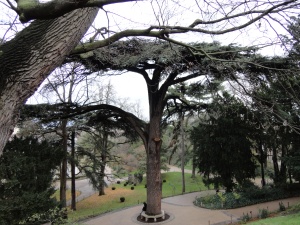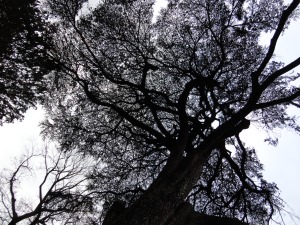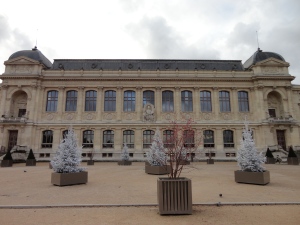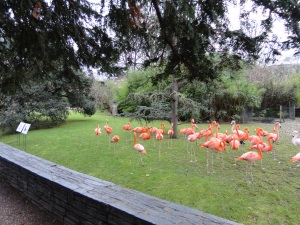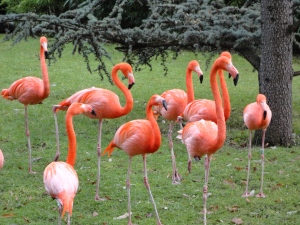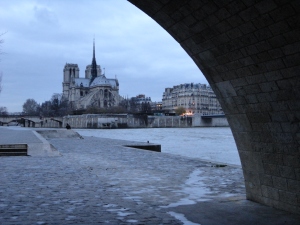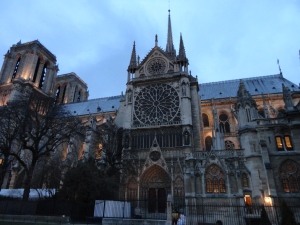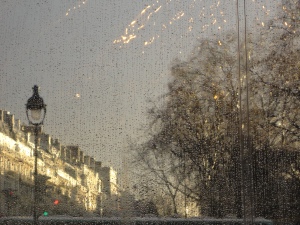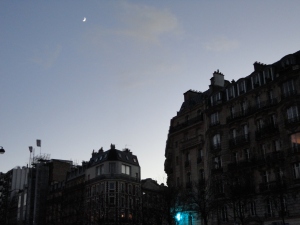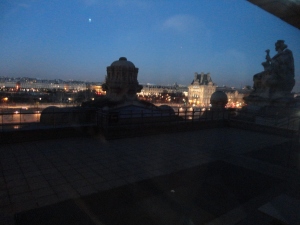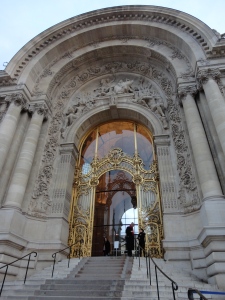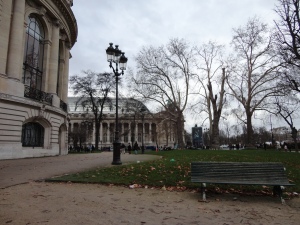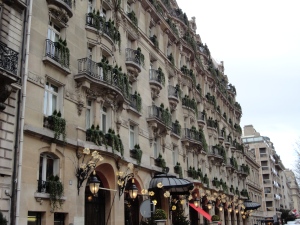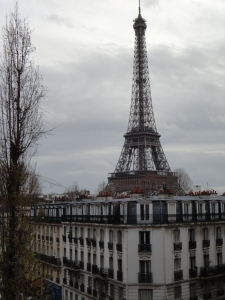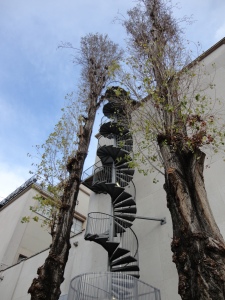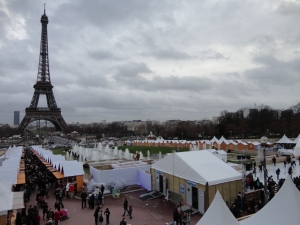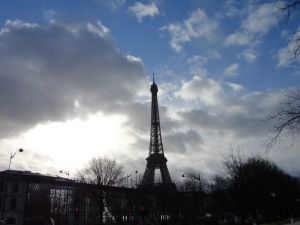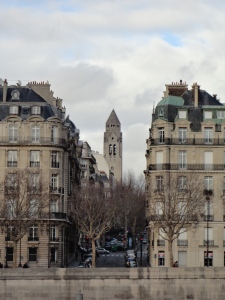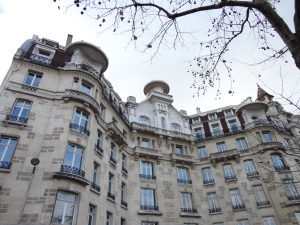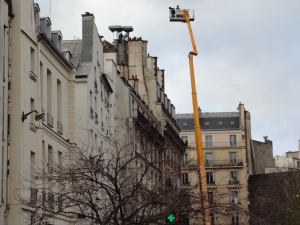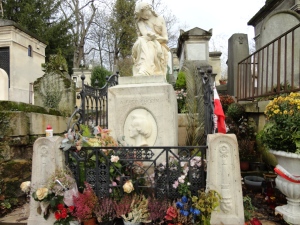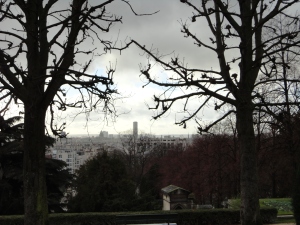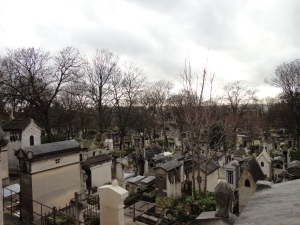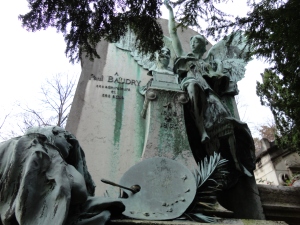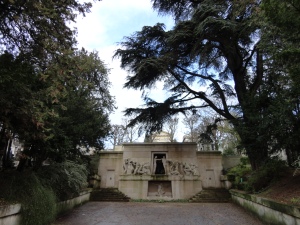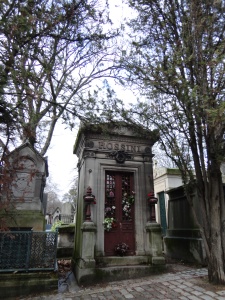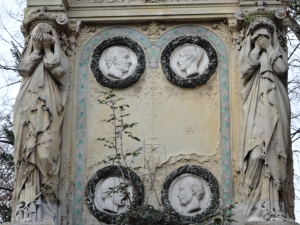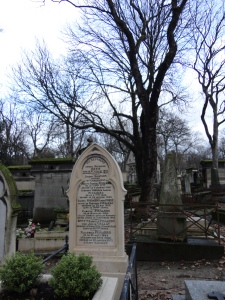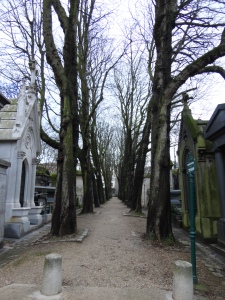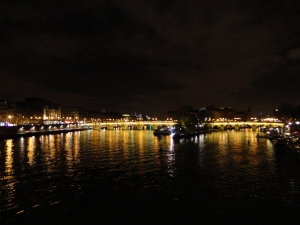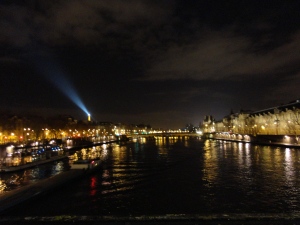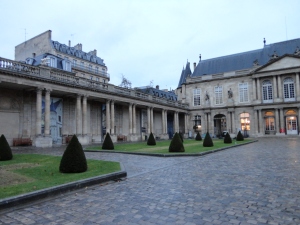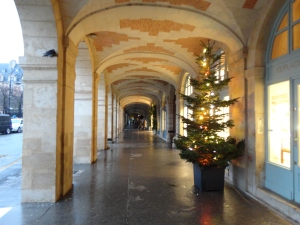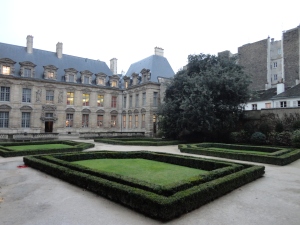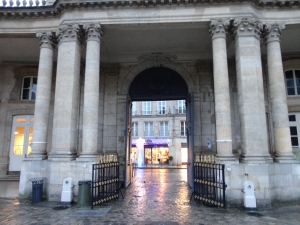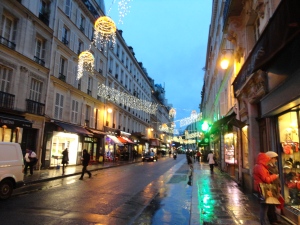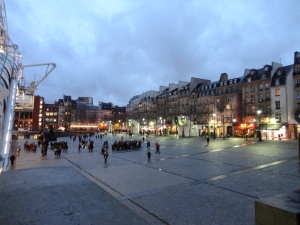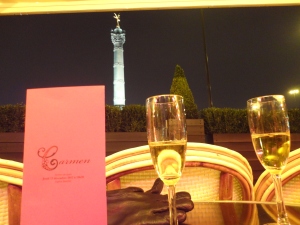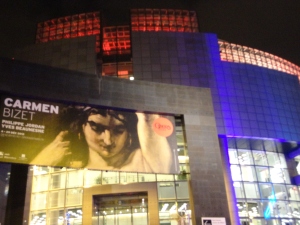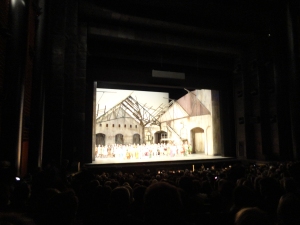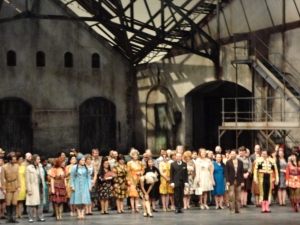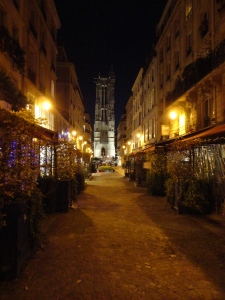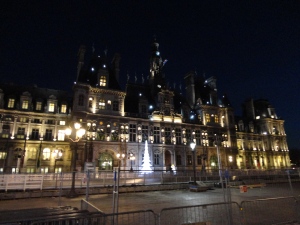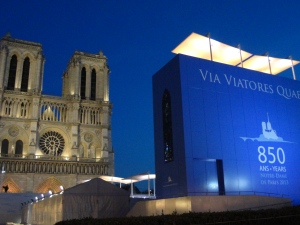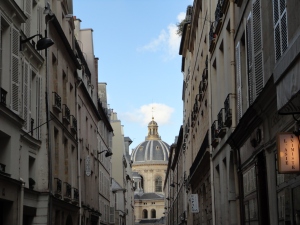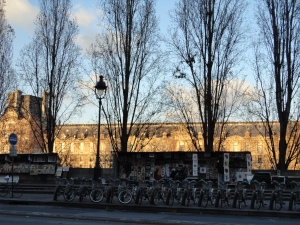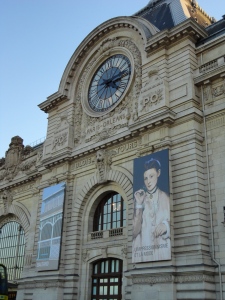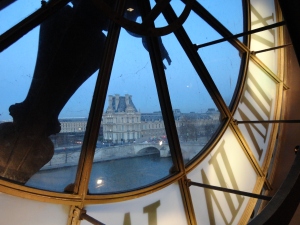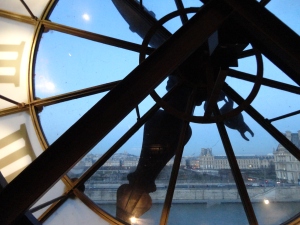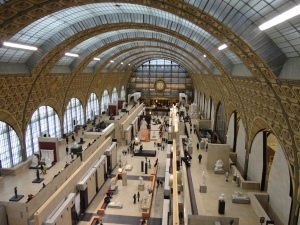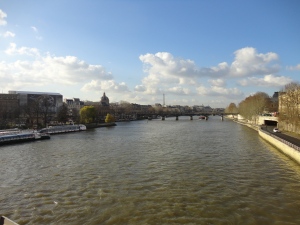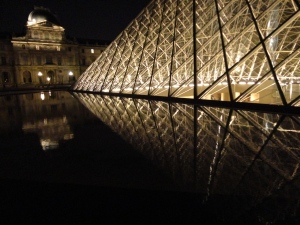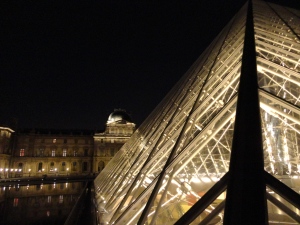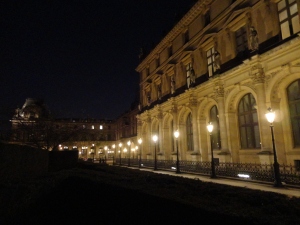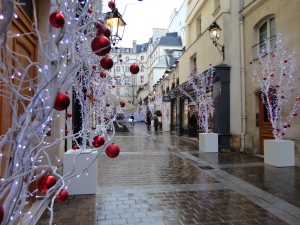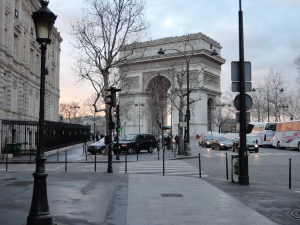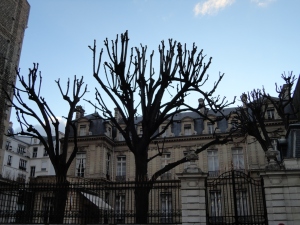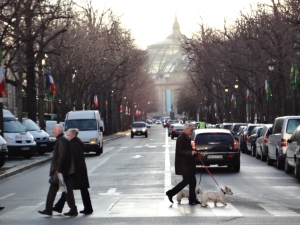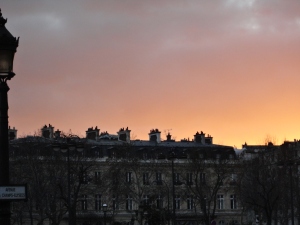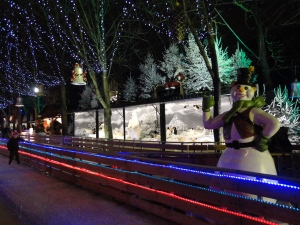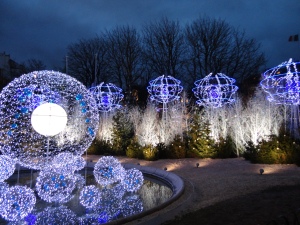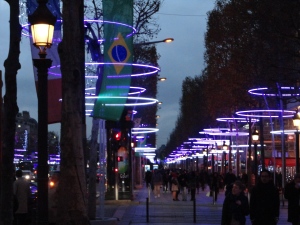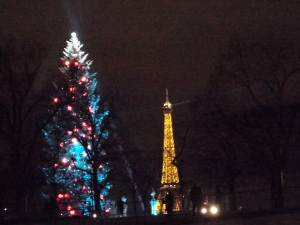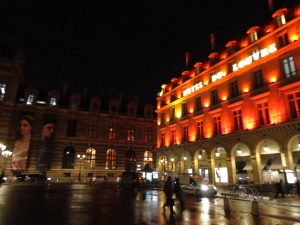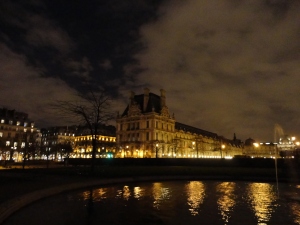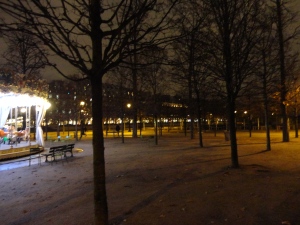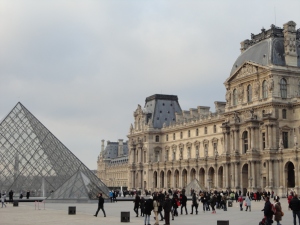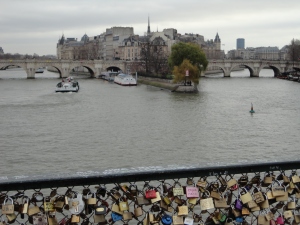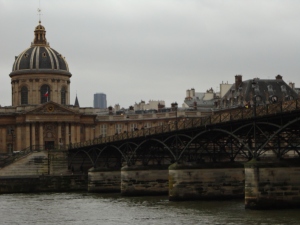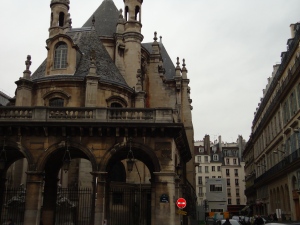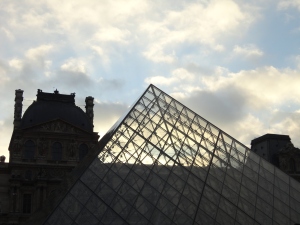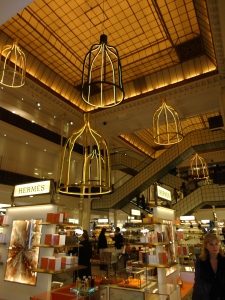Afterword
December 19, 2012
The End
December 18, 2012
The French seem adept at mixing the macabre with the humorous.
Recently, my wife and I went to see an American film in Paris. Unfortunately only one seat remained, as it was very popular and had just been released. We drew straws.
No, we didn’t do that – who likes to go to the cinema on their own? Crazies.
We went to see a different American film. We bought one of the few remaining tickets – they were suddenly selling fast – and when we arrived the cinema was full, mainly I suspect with people wanting to see the other American film.
What remains with me is not the American film at all, but the French short film that preceded it. It took place on a nondescript shopping mall rooftop. You can tell it’s in Paris because Sacre Coeur is in the far distance. Everything else is plain, in fact for 5 full minutes the audience stares at a concrete wall.
After five minutes of watching a concrete wall and a strange man doing Tai Chi, activity starts to increase. More and more people, with rising intensity, rush past the Tai Chi man and disappear behind the wall. Then, at the height of the panic, a group of young men and women appear. They are highly organised, and quickly paint the wall white, standing on each other’s shoulders when necessary. A final rush of people, seemingly seeking refuge behind the wall. The young people then put down their brushes and paint tins and form letters with their bodies. Two fighter planes fly overhead. A magnesium flash that lasts 20 full seconds, a horrible noise. A nuclear explosion.
Focus resumes, and nothing remains other than the solid concrete wall and the after-image of the young men and women on the wall, like black shadows.
‘The End’.
Our time in Paris is almost at an end. I have found myself again.
J.
Verticals
December 17, 2012
Once, I was bedridden in Florence. I was trapped in my third floor hotel room for three days and nights. Every necessary and pressing trip to the bathroom allowed me, once each crisis had passed, to look through the small window out across the city. What dominated the skyline were church spires and bell towers as they rose above the red-tiled roofs. There were also thousands of television antennas – clusters of crucifixes.
Every hour the church bells rang out, reminding me of what I was missing. But it was also comforting, as the experience was a new one and something I could not experience at home. Limited to this view and these sounds, the essence of Florence was concentrated. Undeniably, church spires and bells and television antennas are key features of Florence, regardless of what else you may notice and experience while staying there. They certainly were for my first three days and live in my memory.
Thanks to the architect Haussmann, the Paris skyline is very uniform, which likewise serves to accentuate its key features and landmarks.
Our long-term memories are like city skylines.
Looking back over a long day’s walk to the Eiffel Tower, having traveled next to the Seine, and in and out of the various city blocks, we look out over the city from our starting place, to the landmarks. We remember the greater secrets we have seen in the smaller places, but these are inexplicable and invisible to others.
à oublier
December 16, 2012
Occasionally, one wakes from a sleep so profoundly peaceful that it is an imagining of death. Time has passed, and that is all; time has passed. There were no markers to break up this passage of time – no rising to just below the surface of consciousness. No memories.
Then the realization occurs: in this place of forgetting, there were no troubles. In this place, nothing concerned you and nothing was concerned with you.
To forget. To disappear. To let one’s mind dissolve.
Rain in the Marais
December 15, 2012
Each time I visit the Marais quarter, it rains.
It stains the grey walls a darker grey, the heavy clouds roll over the crooked laneways. Umbrellas jostle each other on the narrow footpaths. The black trunks of the savagely pruned trees clutch at the sky.
Shops line the streets selling warmth. Falafels and spiced red cabbage, Jewish braided Challah bread, chocolates, coffee.
After every second city block, formal gardens appear, adorned with classical sculptures and topiary.
The largest and oldest, the Place des Vosges is at the centre of this grey labyrinth. Its red-bricked apartments gleam. We rest at Café Hugo. We circle the square many times, looking at the art galleries under their vaulted arcades.
We return to cross over the Seine again, along the grey streets, between grey walls and under a dark grey roof.
A.
Soiree de Gala
December 14, 2012
First nights are always a mixture of nerves: excitement and fear.
This combination of emotions tends to produce the very best and the very worst in a performance. Senses are hyper-aware, self-critique is overwrought. What is remembered from first-night performances are mistakes that were not as large as they seemed. What is forgotten is the way emotions charged the performers and the audience to create a bond that cannot be re-captured.
The second night is the worst.
The adrenaline has drained out. Already, the experience is not new and a strange complacency sets in.
From the third night of performance, there is a reliable standard and the performers blend familiarity with enjoyment. If you are going to a show or production, go on the third night or later, unless you like being part of the adrenaline – for this I also recommend the final night – more of that some other time.
I remember playing in the orchestra for a season of Die Fledermaus. The conductor was a crazy Russian who communicated not through his arms and baton, but through telepathy. But no-one could read his projected thoughts. Tempos were wild fluctuations at the mercy of the singers’ nightly fancies, the beginnings and endings of arias were always unpleasant surprises. Everything about this production was like walking the tightrope, 100 stories high. The first night was truly an exercise in fear control.
The National Paris Opera (l’Opera national de Paris) has just launched their Christmas season of Carmen. Spare a thought for the performers. Millions of hours have brought them to the Opera Bastille.
A.
Le Mood
December 13, 2012
As we all know, the French are fiercely protective of their heritage, and proud of their cultural history. In their capital this is very evident. Notre Dame is about to celebrate its 850th year.
They are also proud of their modern history. Sylvia Beach’s bookstore ‘Shakespeare and Company’ maintains its own traditions – aspiring writers can sleep on one of the many beds located on the two floors, surrounded by shelves and towers of books. George Whitman, Sylvia’s successor, died on the 14th of December last year. The bookshop is still crowded every day, even in winter, and stays open until 11 pm.
There are also national laws protecting the institution/ heritage of France’s food culture. Unfortunately, sometimes these laws are ineffective, even within its own borders.
I recall a meal I once had in a restaurant near the Louvre, and while not terrible by any stretch of the imagination, it did require some appreciation of comedy – Fawlty Towers was uppermost in my mind.
Despite itself, the restaurant was full – we were lucky to get a table. We ordered off the set menu, 22 euros for 3 courses – not bad considering what was on offer: our usual favourites of Confit de Canard and Crème Brulee.
Things started to unravel from the entrée. As we tried our ‘entry-level’ foie gras and shrimp cocktail (complete with just picked, unripe avocado), the music mix flicked over to George Michael’s Careless Whisper. The table of four Frenchman behind us loudly declared: “Le Mood!” There was no returning.
We were interrupted many times for plate clearing, still chewing. The boeuf bourguignon was prepared l’ancienne – which seemed to mean that it was simply covered with a concealing crust. The Crème Brulee was, as my broken French described to our nearby Parisian diners ‘Tres, tres Oeuf’. I indicated that the tiramisu was, however, tres bon.
They had arrived shortly after us, and as the waiter relayed their dessert order to the kitchen (shouting directly over us), we couldn’t help but giggle: ‘Quatre Tiramisu’. The tiramisu emerged soon after, ugly but good. At this point we suspected an Italian French-fraud in charge of the kitchen.
A good thing the heritage of French food is being protected.
A.
Renewal
December 12, 2012
“Paris was always worth it and you received return for whatever you brought to it.”
– A Moveable Feast, Hemingway
My friend’s wife once told me she had a ‘ten day rule’ concerning Paris – she refused to stay for fewer than ten days. A holiday would invariably revolve around Paris.
The main reason for this was the riches of Paris. Take the Musee d’Orsay for example. You cannot hope to go once to the Musee d’Orsay and take everything in. It does not matter how long your day there is, even if you arrive at opening time, and as darkness descends find yourself gazing through the hands of that magnificent clock as it clicks over to 6 pm with the attendants desperately trying to usher you out.
Like most attractions in Paris, the Musee d’Orsay requires many return visits. It is of course the same in Rome, London and Vienna, but Paris is better at beguiling. There is a softer persuasion about Paris, a sexy suggestion.
Rome almost towers over you with its gigantic monuments and it knows itself and conveys this self-assurance at almost every opportunity: “Look at my glorious past, foreigner! Worship me!”
London is a multiplicitous city that astounds with its breadth and depth – with an overwhelming variety and energy. It spins with a wicked speed.
Vienna, like a giant doll’s house, opens its many doors to many wondrous rooms – but gradually, one by one. Vienna is a very beautiful, restrained city.
Paris seduces with its endless beauty, its red and amber glow; as Joyce described, its ‘lemon streets’. Like those other cities, a single visit, or a stay fewer than ten days is not enough to appreciate Paris, on any level other than a wonderful first impression.
Day after day, year after year, each time you bring yourself back to the same paintings, the same streets and monuments, the same cafes, you bring new things with you and can appreciate all of the things you have seen before. You can enjoy the nostalgia of your past experiences while seeing things anew. There is no need to re-create past experiences. Each new day in Paris is a renewal. The subtle turmoil of the Seine contained within its pristine walls expresses this sense of constant change within the boundaries of what can be recollected from the past. One short visit to Paris is not enough.
Walking home each day through the grounds of the Louvre – twilight turning to night, is a delightful blend of the familiar and the new.
A.
Beautiful by design (and meticulous maintenance)
December 11, 2012
When I first visited Paris, I must confess to an initial feeling of disappointment – the beauty of the city felt contrived. Or perhaps it was because its vistas had become clichés. There was not a thing out of place, even the banks of the Seine were walled in. It seemed as if no part of the city had been left to develop organically – there was an over-protected purity about it.
However, upon closer inspection, one quickly realizes that the human population is imperfect enough, or to state more kindly, various enough. The café waiters with their dry wit, the dogs in department stores with their owners carrying their bags, the crowded apartment blocks; in short, the life of the city in and around the beautiful architecture was the real decoration and finish. To use an apt cliché, the city of Paris is a living museum.
It is difficult to resist falling in love with Paris. And of course I mean the old city, the arrondissements – I’m sure if you spent any time in the outer suburbs, let alone the shantytowns at the edge, you would quickly experience the other colours in the spectrum. The ‘trained’ beggars on all the main boulevards are constant reminders of this other, less-than-perfect reality.
My friend, your pictures convey Paris’s perfect beauty.
Anders.
P.S. My friend has found it unnecessary to provide me with further running commentary of his travels, or strange interpretations through poetry and prose. I now merely have access to his blog, which has turned out to be nothing but photo galleries – he projects no personality there. I will act as a vessel through which his visual observations are channeled – 4 sets of eyes: my friend’s, his camera lens, mine and yours. Let’s keep it pure, like the old city of Paris.
24 Hour Trilogy, Part 3: ‘Quotidien’
December 10, 2012
We all fall into routines. Thoreau wrote in Walden that after a few months of staying in his primitive cabin by the pond, he had made clear tracks through the woods. Whereas until then he had left no imprint of his existence, it was clear that his small patch of wilderness had been ‘tamed’ to some degree.
What daily activities do we undertake?
In a working week, they are very defined and regular. We are ruled by the clock.
On our days off, most of us still tend to follow a structured routine determined by things that need to be done, rather than enjoying expanses of time that seem to have no end, and certainly have no divisions other than day and night, breakfast and dinner.
On our holidays, routines inevitably set in – we find our ‘natural’ rhythm.
My friend describes the changes in his routine having moved from London to Paris, as influenced by the very nature of those two different cities. Late nights, late mornings – this is how his days are broadly framed in Paris. Daily walks across the city, and unlike the Tube in London, there is little need for the Metro despite its efficiency. Every station travelled underground is a beautiful city block missed, a Haussmann boulevard neglected. Walking is Paris-paced – Londoners in Paris can be recognized by their purposeful walks. It takes a moment to settle into the walking pace of this city – to become a flaneur. There are visits to the nearby boulangeries and patisseries – baguettes are sometimes bought twice daily. Each day requires that an untried Bourgogne is sampled. Each night the amber city lights glow, sometimes twinkling through light rain, illuminating the immaculate apartment ‘street walls’, the mansard roofs and dormer windows.
My friend has fallen into a new routine – a set of daily activities that are undertaken for pleasure in Paris. These tracks have been made by others before him, and he has naturally found his own tracks from previous visits, but the city has been built to accommodate such routines as these.
I need more than a day to recover from this news,
Anders.
